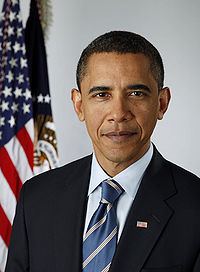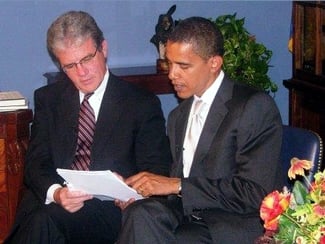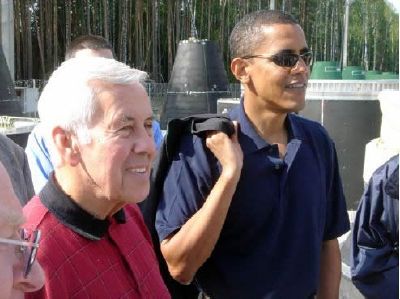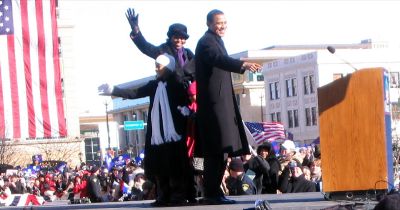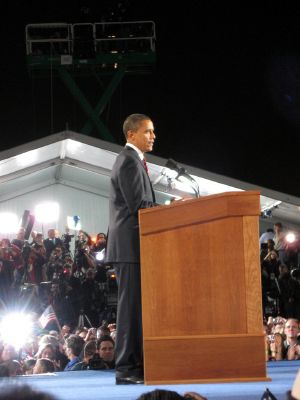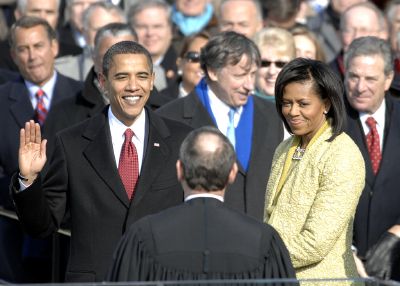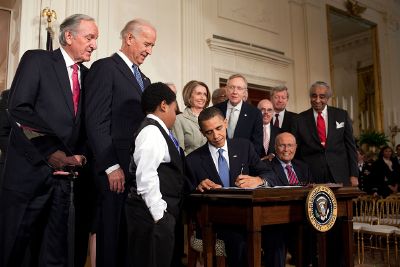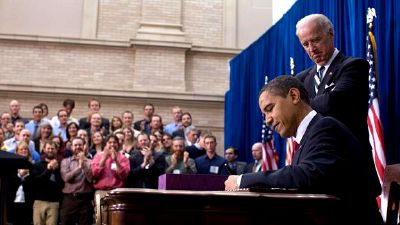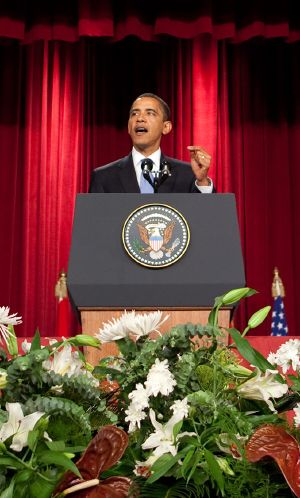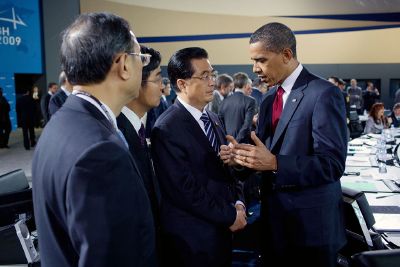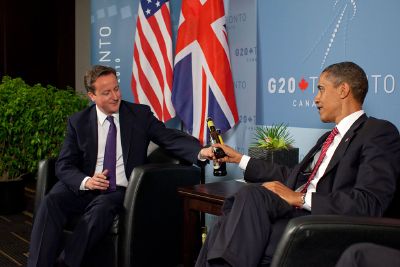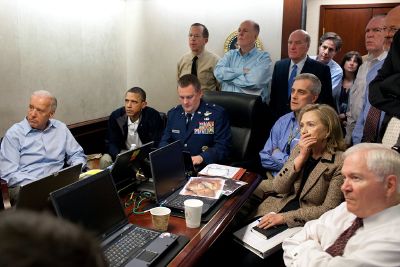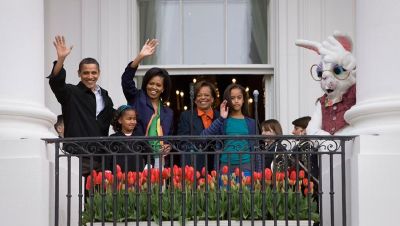Barack Obama
| Term of office | January 20, 2009 – January 20, 2017 |
| Preceded by | George Walker Bush |
| Succeeded by | |
| Date of birth | August 4, 1961 |
| Place of birth | Honolulu, Hawaii |
| Spouse | Michelle Robinson |
| Political party | Democrat |
Barack Hussein Obama II (born August 4, 1961) served as the 44th President of the United States from 2009 to 2017. He is the first African American to hold the office. Obama previously served three terms representing the 13th District in the Illinois Senate from 1997 to 2004 and then as a United States Senator from Illinois, from January 2005 until he resigned following his victory in the 2008 presidential election when he defeated Republican nominee John McCain.
Obama graduated from Columbia University and Harvard Law School, where he was the president of the Harvard Law Review. He was a community organizer in Chicago before earning his law degree. He worked as a civil rights attorney in Chicago and taught constitutional law at the University of Chicago Law School from 1992 to 2004.
As president, Obama enacted policy changes regarding health care, signed economic stimulus legislation, and repealed the "Don't ask, don't tell" policy on homosexuals serving in the military. In foreign policy, he ended the war in Iraq, increased troop levels in Afghanistan, signed the New START arms control treaty with Russia, ordered US involvement in the 2011 Libya military intervention, and ordered the military operation that resulted in the death of Osama bin Laden.
Obama was elected president with a campaign that inspired Americans that change was possible, that the country and the world could move forward into a brighter future, at a time of two on-going wars and an economic recession. He was awarded the Nobel Peace Prize during his first months as president.
Early life
According to official documents Barack Obama was born on August 4, 1961 at Kapiʻolani Maternity & Gynecological Hospital in Honolulu, Hawaii,[1] which would make him the first President to have been born in Hawaii. However, there has been significant controversy surrounding his place of birth, with several sources stating that he was born in Kenya and raised in Indonesia and Hawaii.[2][3]
His mother, Stanley Ann Dunham, was born in Wichita, Kansas, and was of mostly English ancestry, along with Scottish, Irish, German, and Swiss.[4][5][6][7] His father, Barack Obama, Sr., was a Luo from Nyang’oma Kogelo, Nyanza Province, Kenya. Obama's parents met in 1960 in a Russian class at the University of Hawaiʻi at Mānoa, where his father was a foreign student on scholarship.[8][9] The couple married on February 2, 1961,[10] separated when Obama Sr. went to Harvard University on scholarship, and divorced in 1964.[8] Obama Sr. remarried and returned to Kenya, visiting Barack in Hawaii only once, in 1971. He died in an automobile accident in 1982.[11]
After her divorce, Dunham married Indonesian Lolo Soetoro, who was attending college in Hawaii. When Suharto, a military leader in Soetoro's home country, came to power in 1967, all Indonesian students studying abroad were recalled, and the family moved to the Menteng neighborhood of Jakarta.[9] From ages six to ten, Obama attended local schools in Jakarta, including Besuki Public School and St. Francis of Assisi School.[12]
In 1971, Obama returned to Honolulu to live with his maternal grandparents, Madelyn and Stanley Armour Dunham, and with the aid of a scholarship attended Punahou School, a private college preparatory school, from fifth grade until his graduation from high school in 1979.[9] Obama's mother returned to Hawaii in 1972, remaining there until 1977 when she went back to Indonesia to work as an anthropological field worker. She finally returned to Hawaii in 1994 and lived there for one year before dying of ovarian cancer.[10]
Reflecting later on his years in Honolulu, Obama wrote: "The opportunity that Hawaii offered—to experience a variety of cultures in a climate of mutual respect—became an integral part of my world view, and a basis for the values that I hold most dear."[13] However, he struggled with the absence of his father, his own racial heritage, and being raised by a white family in a culture that had few black students. Obama has also written and talked about using alcohol, marijuana and cocaine during his teenage years to "push questions of who I was out of my mind."[9] At the 2008 Civil Forum on the Presidency, Obama identified his high-school drug use as a great moral failure.[14]
Following high school, Obama moved to Los Angeles in 1979 to attend Occidental College.[15] In 1981, he transferred to Columbia University in New York City, where he majored in political science with a specialty in international relations and graduated with a Bachelor of Arts in 1983.[16]
Further education and early career
After graduation Obama worked for a year at the Business International Corporation, then at the New York Public Interest Research Group.[9] He was hired as director of the Developing Communities Project (DCP) in Chicago, where he worked as a community organizer from June 1985 to May 1988.[9] Obama helped set up a job training program, a college preparatory tutoring program, and a tenants' rights organization in Altgeld Gardens.[17] In mid-1988, he traveled for the first time in Europe for three weeks and then for five weeks in Kenya, where he met many of his paternal relatives for the first time.[9]
In late 1988, Obama entered Harvard Law School. He was selected as an editor of the Harvard Law Review at the end of his first year,[18] and president of the journal in his second year.[17][19] In 1989 he worked as a summer associate in the Chicago office of the law firm Sidley Austin where he met his future wife, Michelle Robinson, who was an associate at the firm at the time. After graduating with a J.D. from Harvard in 1991, he returned to Chicago.[18] Obama's election as the first black president of the Harvard Law Review gained national media attention[17][19] and led to a publishing contract and advance for a book about race relations, which evolved into a personal memoir. The manuscript was published in mid-1995 as Dreams from My Father.[9]
In 1991, Obama accepted a two-year position as Visiting Law and Government Fellow at the University of Chicago Law School to work on his first book. He taught at the University of Chicago Law School for twelve years—as a Lecturer from 1992 to 1996, and as a Senior Lecturer from 1996 to 2004—teaching constitutional law.
From April to October 1992, Obama directed Illinois's Project Vote, a voter registration drive with ten staffers and seven hundred volunteer registrars; it achieved its goal of registering 150,000 of 400,000 unregistered African Americans in the state, and led to Crain's Chicago Business naming Obama to its 1993 list of "40 under Forty" powers to be.[20] In 1993 he joined Davis, Miner, Barnhill & Galland, a law firm specializing in civil rights litigation and neighborhood economic development, where he represented community organizers, discrimination victims, and black voters trying to force a redrawing of city ward boundaries.[21]
Legislative career: 1997–2008
Obama served three terms in the Illinois Senate. In 2000, he lost a Democratic primary run for the U.S. House of Representatives to four-term incumbent Bobby Rush by a margin of two to one.[22] In 2002 he began his campaign for the U.S. Senate, winning his seat in November, 2004. Already noticed by the Democratic Party, he became the Democratic presidential candidate in 2008.
State Senator: 1997–2004
Obama was elected to the Illinois Senate in 1996, succeeding State Senator Alice Palmer as Senator from Illinois's 13th District. He was reelected to the Illinois Senate in 1998, defeating Republican Yesse Yehudah in the general election, and was reelected again in 2002.
Once elected, Obama gained bipartisan support for legislation reforming ethics and health care laws.[23] In January 2003, Obama became chairman of the Illinois Senate's Health and Human Services Committee when Democrats, after a decade in the minority, regained a majority.
He also continued his human rights advocacy, sponsoring and leading unanimous, bipartisan passage of legislation to monitor racial profiling by requiring police to record the race of drivers they detained, and legislation making Illinois the first state to mandate videotaping of homicide interrogations.[24]
In May 2002, Obama commissioned a poll to assess his prospects in a 2004 U.S. Senate race. He created a campaign committee, began raising funds, and lined up political media consultant David Axelrod by August 2002, and formally announced his candidacy in January 2003.
Decisions by Republican incumbent Peter Fitzgerald and his Democratic predecessor Carol Moseley Braun not to participate in the election resulted in wide-open Democratic and Republican primary contests involving fifteen candidates, including seven millionaires. In the March 2004 primary election, Obama won in an unexpected landslide—which overnight made him a rising star within the national Democratic Party. In July 2004, Obama delivered the keynote address at the 2004 Democratic National Convention, seen by 9.1 million viewers. His speech was well received and elevated his status within the Democratic Party, and laid the foundation for his presidential campaign.[25]
Obama's expected opponent in the election for the U.S. Senate seat, Republican primary winner Jack Ryan, withdrew from the race in June 2004.[26][27] Six weeks later, Alan Keyes accepted the Republican nomination to replace Ryan. In the election Obama won with 70 percent of the vote.
Obama resigned from the Illinois Senate in November 2004, following his election to the U.S. Senate.
U.S. Senator: 2005–2008
Obama was sworn in as a senator on January 3, 2005, and served until November 16, 2008. [28]
Legislation
Obama cosponsored the Secure America and Orderly Immigration Act. He introduced two initiatives bearing his name: Lugar–Obama, which expanded the Nunn–Lugar cooperative threat reduction concept to conventional weapons;[29] and the Federal Funding Accountability and Transparency Act of 2006, which authorized the establishment of USAspending.gov, a web search engine on federal spending.
Regarding tort reform, Obama voted for the Class Action Fairness Act of 2005 and the FISA Amendments Act of 2008, which grants immunity from civil liability to telecommunications companies complicit with NSA warrantless wiretapping operations.[30]
In January 2007, Obama and Senator Feingold introduced a corporate jet provision to the Honest Leadership and Open Government Act, which was signed into law in September 2007. Obama also introduced Deceptive Practices and Voter Intimidation Prevention Act, a bill to criminalize deceptive practices in federal elections,[31] and the Iraq War De-Escalation Act of 2007,[32] neither of which has been signed into law.
Later in 2007, Obama sponsored an amendment to the Defense Authorization Act adding safeguards for personality-disorder military discharges. Obama also sponsored a Senate amendment to the State Children's Health Insurance Program, providing one year of job protection for family members caring for soldiers with combat-related injuries.
Committees
Obama held assignments on the Senate Committees for Foreign Relations, Environment and Public Works and Veterans' Affairs through December 2006.[33] In January 2007, he left the Environment and Public Works committee and took additional assignments with Health, Education, Labor and Pensions and Homeland Security and Governmental Affairs.[34] He also became Chairman of the Senate's subcommittee on European Affairs. As a member of the Senate Foreign Relations Committee, Obama made official trips to Eastern Europe, the Middle East, Central Asia, and Africa.
Presidential campaigns
2008 presidential campaign
On February 10, 2007, Obama announced his candidacy for President of the United States in front of the Old State Capitol building in Springfield, Illinois.[35] The choice of the announcement site was viewed as symbolic because it was also where Abraham Lincoln delivered his historic "House Divided" speech in 1858.[35] Obama emphasized the issues of rapidly ending the Iraq War, increasing energy independence, and providing universal health care, in a campaign that projected themes of "hope" and "change."[36]
A large number of candidates entered the Democratic Party presidential primaries, including Senator Hillary Rodham Clinton of New York and former Senator John Edwards of North Carolina. The field narrowed to a duel between Obama and Senator Clinton after early contests. The contest remained competitive for longer than expected as a close race continued between Obama and Senator Clinton, due in part to their being the first viable African American and female presidential contenders. On June 7, 2008, Clinton finally ended her campaign and endorsed Obama.
At the Democratic National Convention in Denver, Colorado, Hillary Clinton called for her supporters to endorse Obama.[37] Obama delivered his acceptance speech, not at the center where the Democratic National Convention was held, but at Invesco Field at Mile High to a crowd of over 75,000; the speech was viewed by over 38 million people worldwide.[38] On August 23, Obama announced his selection of Delaware Senator Joe Biden as his vice presidential running mate.
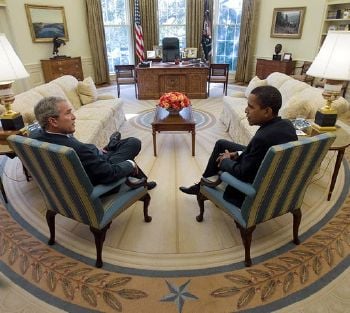
Senator John McCain from Arizona was nominated as the Republican candidate. On November 4, Obama won the presidency with 365 electoral votes to 173 received by McCain; Obama won 52.9 percent of the popular vote to McCain's 45.7 percent. He became the first African American to be elected president.[39] Obama delivered his victory speech before hundreds of thousands of supporters in Chicago's Grant Park.[40]
2012 presidential campaign
On April 4, 2011, Obama announced his re-election campaign for 2012 in a video titled "It Begins with Us" that he posted on his website as well as filing election papers with the Federal Election Commission.[41]
Presidency
First days
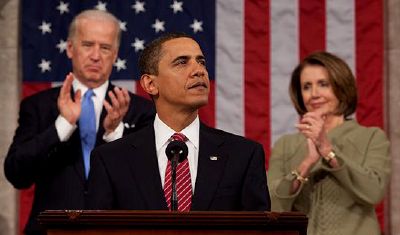
The inauguration of Barack Obama as the 44th President, and Joe Biden as Vice President, took place on January 20, 2009. Members of his Cabinet included Hillary Rodham Clinton as Secretary of State, Timothy Geithner as Treasury Secretary, and Eric Holder as Attorney General; Robert Gates, who had assumed the office of Secretary of Defense in 2006, under then-President George W. Bush, was retained in that position.
Amid high expectations of his "first 100 days in office," Obama suspended all pending federal regulations proposed by outgoing President George W. Bush so that they could be reviewed and signed a number of bills relating to domestic issues. He also issued executive orders and presidential memoranda directing the U.S. military to develop plans to withdraw troops from Iraq.[42] He ordered the closing of the Guantanamo Bay detention camp "as soon as practicable," although in May 2009 the Senate voted to keep the prison open for the foreseeable future and to prohibit the transfer of detainees to facilities in the United States.
Domestic policy
The first bill signed into law by Obama was the Lilly Ledbetter Fair Pay Act of 2009, relaxing the statute of limitations for equal-pay lawsuits.[43] In March 2009, Obama reversed a Bush-era policy which had limited funding of embryonic stem cell research, stating that he believed "sound science and moral values ... are not inconsistent" and pledged to develop "strict guidelines" on the research to prevent its use in human cloning.[44]
Other significant measures taken by Obama and his administration include:
- The Matthew Shepard and James Byrd, Jr. Hate Crimes Prevention Act, a measure that expanded the 1969 United States federal hate-crime law to include crimes motivated by a victim's actual or perceived gender, sexual orientation, gender identity, or disability.
- The Don't Ask, Don't Tell Repeal Act of 2010, a bill that provided for repeal of the "Don't ask, don't tell" policy of 1993 that has prevented gay and lesbian people from serving openly in the United States Armed Forces.[45]
- The Health Care and Education Reconciliation Act, a reconciliation bill which ended the process of the federal government giving subsidies to private banks to give out federally insured loans, increased the Pell Grant scholarship award, and made changes to the Patient Protection and Affordable Care Act.
- Obama announced a change in direction at NASA, the U.S. space agency, ending plans for a return of human spaceflight to the moon and ending development of the Ares I rocket, Ares V rocket, and Constellation program. Instead, NASA would be asked to monitor climate change and develop a new rocket capable of exploration of the solar system.[46]
- Although Obama vowed to close the Guantanamo Bay detention camp by January 2010, the United States Senate passed an amendment to the Supplemental Appropriations Act of 2009 (H.R. 2346) to block funds needed for the transfer or release of prisoners held at the camp. Obama still issued a Presidential memorandum dated December 15, 2009, ordering the preparation of the Thomson Correctional Center, Thomson, Illinois so as to enable the transfer of Guantanamo prisoners there. However, in January 2011 he signed the 2011 Defense Authorization Bill which placed restrictions on the transfer of Guantanamo prisoners to the mainland or to other foreign countries, thus impeding the closure of the detention facility.[47] According to U.S. Secretary of Defense Gates, "The prospects for closing Guantanamo as best I can tell are very, very low given very broad opposition to doing that here in the Congress."[48]
Obama appointed two women to serve on the Supreme Court in the first two years of his Presidency. Sonia Sotomayor, nominated by Obama on May 26, 2009, to replace retiring Associate Justice David Souter, was confirmed on August 6, 2009, becoming the first Hispanic to be a Supreme Court Justice.[49] Elena Kagan, nominated by Obama on May 10, 2010, to replace retiring Associate Justice John Paul Stevens, was confirmed on August 5, 2010, bringing the number of women sitting simultaneously on the Court to three, for the first time in American history.[50]
On January 25, 2011, in his 2011 State of the Union Address, President Obama focused strongly on the themes of education and innovation to make the United States more competitive globally.[51]
In 2012, shortly after the official launch of his campaign for re-election as president, Obama publicly affirmed his personal support for the legalization of same-sex marriage, becoming the first sitting U.S. president to do so.[52]
Health care reform
Obama called for Congress to pass legislation reforming health care in the United States, a key campaign promise and a top legislative goal. He proposed a controversial expansion of health insurance coverage to cover the uninsured, to cap premium increases, and to allow people to retain their coverage when they leave or change jobs. It would also make it illegal for insurers to drop sick people or deny them coverage for pre-existing conditions, and require every American carry health coverage.
On July 14, 2009, House Democratic leaders introduced a 1,017-page plan for overhauling the U.S. health care system, which Obama wanted Congress to approve by the end of 2009. After much public debate during the Congressional summer recess of 2009, Obama delivered a speech to a joint session of Congress on September 9 where he addressed concerns over the proposals.[53]
On March 21, 2010, the Patient Protection and Affordable Care Act passed by the Senate in December was passed in the House by a vote of 219 to 212. Obama signed the bill into law on March 23, 2010. The Patient Protection and Affordable Care Act includes health-related provisions to take effect over four years, including expanding Medicaid eligibility for people making up to 133 percent of the federal poverty level (FPL) starting in 2014, subsidizing insurance premiums for people making up to 400 percent of the FPL ($88,000 for family of four in 2010) so their maximum "out-of-pocket" payment for annual premiums will be from 2 to 9.5 percent of income, providing incentives for businesses to provide health care benefits, prohibiting denial of coverage and denial of claims based on pre-existing conditions, establishing health insurance exchanges, prohibiting annual coverage caps, and support for medical research.[54] The maximum share of income that enrollees would have to pay would vary depending on their income relative to the federal poverty level.
Debate and controversy over "Obamacare" did not end with the signing of the bill into law. In March 2012, the Supreme Court of the United States heard arguments by a coalition of 26 states maintaining that it is unconstitutional to force individuals to buy health insurance.[55]
Economic policy
Obama signed the American Recovery and Reinvestment Act of 2009, a $787 billion economic stimulus package aimed at helping the economy recover from the deepening worldwide recession. The act includes increased federal spending for health care, infrastructure, education, various tax breaks and incentives, and direct assistance to individuals over the course of several years.[56]
Obama intervened in the troubled automotive industry, renewing loans for General Motors and Chrysler to continue operations while reorganizing. The White House set terms for both firms' bankruptcies, including a reorganization of GM giving the U.S. government a temporary 60 percent equity stake in the company, with the Canadian government shouldering a 12 percent stake. He also signed into law the Car Allowance Rebate System, known colloquially as "Cash for Clunkers," that temporarily boosted the economy.
A compromise deal with the Congressional Republican leadership including a temporary, two-year extension of the 2001 and 2003 income tax rates, a one-year payroll tax reduction, continuation of unemployment benefits, and a new rate and exemption amount for estate taxes allowed the resulting $858 billion Tax Relief, Unemployment Insurance Reauthorization, and Job Creation Act of 2010 to pass with bipartisan majorities before Obama signed it on December 17, 2010.[57]
When Obama took office in January 2009, unemployment was at 7.8 percent and had been rising since the summer of 2008. It continued to rise in 2009, peaking at 10 percent in October. Following a decrease to 9.7 percent in the first quarter of 2010, the unemployment rate fell to 9.6 percent in the second quarter, where it remained for the rest of the year.[58] Between February and December 2010, employment rose by 0.8 percent, which was less than the average of 1.9 percent experienced during comparable periods in the previous four employment recoveries.[59] The unemployment rate stabilized at close to 9.0 percent for 2011, beginning a small downward trend from November; unemployment had dropped to 8.1 percent by April, 2012—almost down to the level when Obama began his presidency. The Congressional Budget Office (CBO) and a broad range of economists credited Obama's stimulus plan for economic growth.[60]
Obama and the Congressional Budget Office predicted that the 2010 federal budget deficit would be $1.5 trillion or 10.6 percent of the nation's gross domestic product (GDP) compared to the 2009 deficit of $1.4 trillion or 9.9 percent of GDP.[61][62] For 2011, the administration predicted the deficit would shrink slightly to $1.34 trillion, while the ten-year deficit would increase to $8.53 trillion or 90 percent of GDP.[63] On August 2, 2011, after a lengthy congressional debate over whether to raise the nation's debt limit, Obama signed the bipartisan Budget Control Act of 2011. The legislation enforces limits on discretionary spending until 2021, establishes a procedure to increase the debt limit, creates a Congressional Joint Select Committee on Deficit Reduction to propose further deficit reduction with a stated goal of achieving at least $1.5 trillion in budgetary savings over ten years, and establishes automatic procedures for reducing spending by as much as $1.2 trillion if legislation originating with the new joint select committee does not achieve such savings. By passing this legislation lifting the $14.3 trillion cap on U.S. borrowing, Congress was able to prevent an unprecedented U.S. government default on its obligations.
Gulf of Mexico oil spill
On April 20, 2010, an explosion destroyed an offshore drilling rig at the Macondo Prospect in the Gulf of Mexico, causing a major sustained oil leak. The well's operator, BP, initiated a containment and cleanup plan, and began drilling two relief wells intended to stop the flow. Obama visited the Gulf and announced a federal investigation and formed a bipartisan commission to recommend new safety standards, after a review by Secretary of the Interior Ken Salazar and concurrent Congressional hearings. He then announced a six-month moratorium on new deepwater drilling permits and leases, pending regulatory review. As multiple efforts by BP failed, the media and public expressed frustration and criticism over the handling of the incident both by BP and by Obama and the federal government.[64][65]
Foreign policy
Obama's foreign policy began with a determined effort to change the relations between the United States and other parts of the world, particularly Russia and the Middle East. In February and March, Vice President Joe Biden and Secretary of State Hillary Rodham Clinton made separate overseas trips to announce a "new era" in U.S. foreign relations with Russia and Europe. Obama attempted to reach out to Arab leaders by granting his first interview to an Arab cable TV network, Al Arabiya. On June 4, 2009, Obama delivered a speech at Cairo University in Egypt calling for "a new beginning" in relations between the Islamic world and the United States and promoting Middle East peace.[66] Largely as a result of these efforts, Obama was awarded the Nobel Peace Prize in 2009 "for his extraordinary efforts to strengthen international diplomacy and cooperation between peoples."[67]
Nevertheless, Obama was still faced with the wars in Iraq and Afghanistan.
Iraq War
On February 27, 2009, Obama declared to a group of Marines preparing for deployment to Afghanistan that combat operations in Iraq would end within 18 months: "Let me say this as plainly as I can: By August 31, 2010, our combat mission in Iraq will end."[68] The Obama administration scheduled the withdrawal of combat troops to be completed by August 2010, decreasing troops levels from 142,000 while leaving a transitional force of 35,000 to 50,000 in Iraq until the end of 2011.
On August 19, 2010, the last United States combat brigade exited Iraq; the mission of the remaining troops was to transition from combat operations to counter-terrorism and the training, equipping, and advising of Iraqi security forces.[69] On August 31, 2010, Obama announced that the United States combat mission in Iraq was over.[70] On October 21, 2011 President Obama announced that all U.S. troops would leave Iraq in time to be "home for the holidays."[71] The last U.S. combat troops withdrew from Iraq on December 18, 2011, leaving around 150 U.S. troops remaining in the country attached to a training and cooperation mission at the U.S. embassy on the banks of the Tigris River.[72]
In the aftermath of the U.S. withdrawal numerous terror campaigns have been engaged by Iraqi, primarily radical Sunni, insurgent groups against the central government as well as warfare between various factions within Iraq. These occurrences of post U.S. withdrawal violence have showed increasingly violent patterns, raising concerns that the surging violence might slide into another civil war.[73][74]
War in Afghanistan
Early in his presidency, Obama moved to bolster U.S. troop strength in Afghanistan. On December 1, 2009, Obama announced the deployment of an additional 30,000 military personnel to Afghanistan. He also proposed to begin troop withdrawals 18 months from that date.[75]
He replaced the military commander in Afghanistan, General David D. McKiernan, with former Special Forces commander Lt. Gen. Stanley A. McChrystal in May 2009, indicating that McChrystal's Special Forces experience would facilitate the use of counterinsurgency tactics in the war. However, in June 2010 after McChrystal's staff criticized White House personnel in a magazine article, Obama replaced McChrystal with David Petraeus, who had been responsible for the surge strategy in Iraq.[76]
Osama bin Laden
Starting in July 2010, intelligence developed by the CIA over the next several months determined what they believed to be the location of Osama bin Laden in a large compound in Abbottabad, Pakistan, a suburban area 35 miles from Islamabad. CIA head Leon Panetta reported this intelligence to President Obama in March 2011. Meeting with his national security advisers over the course of the next six weeks, Obama rejected a plan to bomb the compound, and authorized a "surgical raid" to be conducted by United States Navy SEALs. The operation took place on May 1, 2011, resulting in the death of bin Laden and the seizure of papers and computer drives and disks from the compound.[77][78] The body was identified through DNA testing.[79] Bin Laden was buried at sea within 24 hours after his death, with a Muslim funeral service on board an aircraft carrier.[80]
Israel
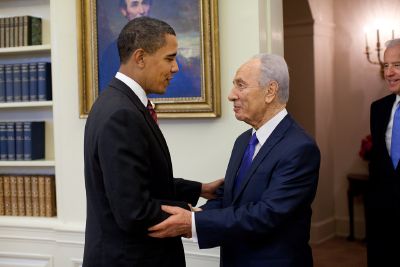
During the initial years of the Obama administration, the U.S. increased military cooperation with Israel, including a record number of U.S. troops participating in military exercises in the country, increased military aid, and the re-establishment of the U.S.-Israeli Joint Political Military Group and the Defense Policy Advisory Group. Part of the military aid increase in 2010 was to fund Israel's missile defense shield. Before his retirement in September 2011, Adm. Mike Mullen, former Chairman of the Joint Chiefs of Staff, made four trips to Israel during his four-year tenure, two of them in 2010. Prior to 2007 no Chairman of the Joint Chiefs had done so for over ten years.[81]
Like previous American presidential administrations, Obama has supported the two-state solution to the Arab-Israeli conflict based on the 1967 borders with land swaps.[82]
Libya
In March 2011, as forces loyal to Muammar Gaddafi advanced on rebels across Libya, formal calls for a no-fly zone came in from around the world, including Europe, the Arab League, and a resolution passed unanimously by the U.S. Senate.[83] In response to the unanimous passage of United Nations Security Council Resolution 1973 on March 17, Gaddafi vowed to "show no mercy" to the rebels.[84] On Obama's orders, the U.S. military took a lead role in air strikes to destroy the Libyan government's air defense capabilities in order to protect civilians and enforce a no-fly-zone, while stating that the U.S. lead role would quickly be transferred to other members of the coalition force involved.[85] Obama's actions ordering military action without approval of the Senate were questioned.[86] On March 25, by unanimous vote of all of its 28 members, NATO took over leadership of the effort, dubbed Operation Unified Protector.[87]
Post-presidency
On March 2, 2017, the John F. Kennedy Presidential Library and Museum awarded the annual Profile in Courage Award to Obama "for his enduring commitment to democratic ideals and elevating the standard of political courage."[88] On May 4, three days ahead of the French presidential election, Obama publicly endorsed centrist Emmanuel Macron over right-wing populist Marine Le Pen: "He appeals to people's hopes and not their fears, and I enjoyed speaking to Emmanuel recently to hear about his independent movement and his vision for the future of France."[89] Macron went on to win the election.
While in Berlin on May 25, Obama made a joint public appearance with Chancellor Angela Merkel where he stressed inclusion and for leaders to question themselves. Obama had been formally invited to Berlin while still in office as part of an effort to boost Merkel's re-election campaign.[90]
Obama hosted the inaugural summit of the Obama Foundation in Chicago from October 31 to November 1, 2017.[91] Obama intends for the foundation to be the central focus of his post-presidency and part of his ambitions for his subsequent activities following his presidency to be more consequential than his time in office.[92] Obama has also written a presidential memoir, A Promised Land, released on November 17, 2020.[93]
Obama went on an international trip from November 28 to December 2, 2017, and visited China, India, and France. In China, he delivered remarks at the Global Alliance of SMEs Summit in Shanghai and met with Chinese Communist Party leader Xi Jinping in Beijing.[94] He then went to India, where he spoke at the Hindustan Times Leadership Summit before meeting with Indian Prime Minister Narendra Modi over lunch. In addition, he held a town hall for young leaders, organized by the Obama Foundation.[95] He also met with the Dalai Lama while in New Delhi.[96] He ended his five-day trip in France where he met with French President Emmanuel Macron, former President François Hollande, and Paris Mayor Anne Hidalgo.
Barack and Michelle Obama signed a deal on May 22, 2018 to produce docu-series, documentaries and features for Netflix under the Obamas' newly formed production company, Higher Ground Productions. On the deal, Michelle said "I have always believed in the power of storytelling to inspire us, to make us think differently about the world around us, and to help us open our minds and hearts to others."[97]
Cultural and political image
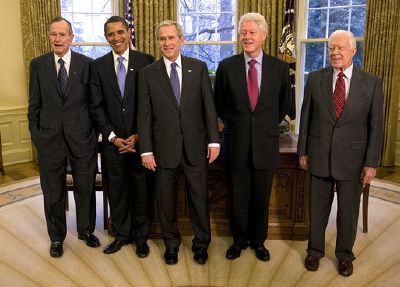
Obama's family history, upbringing, and Ivy League education differ markedly from those of African American politicians who launched their careers in the 1960s through participation in the civil rights movement. Also, Obama is not a descendant of American slaves. Expressing puzzlement over questions about whether he is "black enough," Obama told an August 2007 meeting of the National Association of Black Journalists that "we're still locked in this notion that if you appeal to white folks then there must be something wrong."[98] Obama acknowledged his youthful image in an October 2007 campaign speech, saying: "I wouldn't be here if, time and again, the torch had not been passed to a new generation."[99]
Obama won Best Spoken Word Album Grammy Awards for abridged audiobook versions of Dreams from My Father in February 2006 and for The Audacity of Hope in February 2008.[100] In December 2008, Time magazine named Obama as its Person of the Year for his historic candidacy and election, which it described as "the steady march of seemingly impossible accomplishments."[101]
On October 9, 2009, the Norwegian Nobel Committee announced that Obama had won the 2009 Nobel Peace Prize "for his extraordinary efforts to strengthen international diplomacy and cooperation between peoples."[67] The award drew a mixture of praise and criticism from world leaders and media figures. Obama is the fourth U.S. president to be awarded the Nobel Peace Prize and the third to become a Nobel laureate while in office.[102]
Family and personal life
In a 2006 interview, Obama highlighted the diversity of his extended family "It's like a little mini-United Nations ... I've got relatives who look like Bernie Mac, and I've got relatives who look like Margaret Thatcher."[103] Obama has a half-sister with whom he was raised, Maya Soetoro-Ng, the daughter of his mother and her Indonesian second husband and seven half-siblings from his Kenyan father's family. Obama's mother was survived by her Kansas-born mother, Madelyn Dunham, until her death on November 2, 2008, two days before his election to the Presidency.[104] Obama also has roots in Ireland; he met with his Irish cousins in Moneygall in May 2011.[105] In Dreams from My Father, Obama also tied his mother's family history to possible Native American ancestors and distant relatives of Jefferson Davis, President of the Confederate States of America during the American Civil War.
Obama was known as "Barry" in his youth, but asked to be addressed with his given name during his college years.[106] He plays basketball, a sport he participated in as a member of his high school's varsity team.
Obama is a well known supporter of the Chicago White Sox, and threw out the first pitch at the 2005 ALCS when he was still a senator. He is also primarily a Chicago Bears fan in the NFL, but in his childhood and adolescence was a fan of the Pittsburgh Steelers.[107]
In June 1989, Obama met Michelle Robinson when he was employed as a summer associate at the Chicago law firm of Sidley Austin.[108] They began dating later that summer, became engaged in 1991, and were married on October 3, 1992. The couple's first daughter, Malia Ann, was born on July 4, 1998, followed by a second daughter, Natasha ("Sasha"), on June 10, 2001.[108] The Obama daughters attended the private University of Chicago Laboratory Schools. When they moved to Washington, D.C., in January 2009, the girls started at the private Sidwell Friends School. Their Portuguese Water Dog, named Bo, was a gift from Senator Ted Kennedy.
Religious views
Obama is a Christian whose religious views developed in his adult life. He wrote in The Audacity of Hope that he "was not raised in a religious household." He described his mother, raised by non-religious parents (whom Obama has specified elsewhere as "non-practicing Methodists and Baptists"), to be detached from religion, yet "in many ways the most spiritually awakened person that I have ever known." He described his father as "raised a Muslim," but a "confirmed atheist" by the time his parents met, and his stepfather as "a man who saw religion as not particularly useful."
In an interview with the evangelical periodical Christianity Today, Obama stated: "I am a Christian, and I am a devout Christian. I believe in the redemptive death and resurrection of Jesus Christ. I believe that that faith gives me a path to be cleansed of sin and have eternal life."[109] On September 27, 2010, Obama stated:
I'm a Christian by choice. My family didn't—frankly, they weren't folks who went to church every week. And my mother was one of the most spiritual people I knew, but she didn't raise me in the church. So I came to my Christian faith later in life, and it was because the precepts of Jesus Christ spoke to me in terms of the kind of life that I would want to lead—being my brothers' and sisters' keeper, treating others as they would treat me.[110]
Obama was baptized at the Trinity United Church of Christ, a black liberation church, in 1988, and was an active member there for two decades. He resigned from Trinity during the Presidential campaign after controversial statements made by Rev. Jeremiah Wright became public.[111] After a prolonged effort to find a church to attend regularly in Washington DC, Obama announced in June 2009 that his primary place of worship would be the Evergreen Chapel at Camp David.[112]
Works by Barack Obama
- Obama, Barack. Dreams from My Father: A Story of Race and Inheritance. New York, NY: Three Rivers Press, 2004 (original 1995). ISBN 978-1400082773
- Obama, Barack. The Audacity of Hope: Thoughts on Reclaiming the American Dream. New York, NY: Crown Publishing Group, 2006. ISBN 978-0307455871
- Obama, Barack. In His Own Words: Barack Obama - The American Promise. CreateSpace, 2008. ISBN 978-1440423185
- Obama, Barack. Of Thee I Sing: A Letter to My Daughters. New York, NY: Alfred A. Knopf Books, 2010. ISBN 978-0375835278
- Obama, Barack. A Promised Land. Crown, 2020. ISBN 978-1524763169
Notes
- ↑ David Maraniss, Though Obama had to leave to find himself, it is Hawaii that made his rise possible The Washington Post, August 24, 2008. Retrieved February 18, 2021.
- ↑ Dylan Stableford, 'Born in Kenya': Obama's Literary Agent Misidentified His Birthplace in 1991 ABCNews, May 18, 2012. Retrieved February 18, 2021.
- ↑ Drew Zahn, Shocker! Obama was still 'Kenyan-born' in 2007 WND, May 18, 2012. Retrieved February 18, 2021.
- ↑ Ewen MacAskill and Nicholas Watt, Obama looks forward to rediscovering his Irish roots on European tour The Guardian, May 20, 2011. Retrieved February 18, 2021.
- ↑ Obama urged to create own tartan BBC News, January 20, 2009. Retrieved February 18, 2021.
- ↑ Researchers: Obama has German roots USA Today, June 4, 2009. Retrieved February 18, 2021.
- ↑ Honorary citizenship papers sent to Obama Swissinfo, July 14, 2010. Retrieved February 18, 2021.
- ↑ 8.0 8.1 Janny Scott, Obama’s Young Mother Abroad The New York Times Magazine, April 20, 2011. Retrieved February 18, 2021.
- ↑ 9.0 9.1 9.2 9.3 9.4 9.5 9.6 9.7 Barack Obama, Dreams from My Father: A Story of Race and Inheritance (New York, NY: Three Rivers Press, 2004, ISBN 978-14000827734).
- ↑ 10.0 10.1 Amanda Ripley, The story of Barack Obama's mother TIME Magazine, April 9, 2008. Retrieved February 18, 2021.
- ↑ Kevin Merida, The ghost of a father The Washington Post, December 14, 2007. Retrieved February 18, 2021.
- ↑ Nedra Pickler, Obama debunks claim about Islamic school The Washington Post, January 24, 2007. Retrieved February 18, 2021.
- ↑ B.J. Reyes, Punahou left lasting impression on Obama Honolulu Star-Bulletin, February 8, 2007. Retrieved February 18, 2021.
- ↑ Ed Hornick, Obama, McCain talk issues at pastor's forum CNN, August 17, 2008. Retrieved February 18, 2021.
- ↑ David Remnick, The Bridge: The Life and Rise of Barack Obama (New York, NY: Alfred A. Knopf, 2010, ISBN 978-1400043606).
- ↑ Shira Boss-Bicak, Barack Obama '83 Columbia College Today, January, 2005. Retrieved February 18, 2021.
- ↑ 17.0 17.1 17.2 Linda Matchan, A Law Review breakthrough The Boston Globe (February 15, 1990). Retrieved May 12, 2021.
- ↑ 18.0 18.1 Michael Levenson and Jonathan Saltzman, At Harvard Law, a unifying voice The Boston Globe, January 28, 2007. Retrieved May 12, 2021.
- ↑ 19.0 19.1 Fox Butterfield, First black elected to head Harvard's Law Review The New York Times, February 6, 1990. Retrieved May 12, 2021.
- ↑ Veronica Anderson, "40 under Forty: Barack Obama, Director, Illinois Project Vote" Crain's Chicago Business 16(39) (1993): 4.
- ↑ Mike Robinson, Obama got start in civil rights practice The Boston Globe, February 20, 2007. Retrieved May 12, 2021.
- ↑ Christopher Wills, Obama learned from failed Congress run USA Today, October 24, 2007. Retrieved May 12, 201.
- ↑ Peter Slevin, Obama Forged Political Mettle in Illinois Capitol The Washington Post, February 9, 2007. Retrieved May 12, 2021.
- ↑ Anne Marie Tavella, Profiling, taping plans pass Senate Daily Herald, April 14, 2003. Retrieved May 12, 2021.
- ↑ David Bernstein, The Speech Chicago Magazine, June 2007. Retrieved May 12, 2021.
- ↑ Ted Barrett, John Mercurio, and John Bisney, Ryan drops out of Senate race in Illinois CNN, June 25, 2004.
- ↑ David Mendell, Obama: From Promise to Power (Amistad, 2008, ISBN 0060858214).
- ↑ Biographical Directory of the United States Congress, OBAMA, Barack, (1961 - ). Retrieved May 12, 2021.
- ↑ Richard G. Lugar and Barack Obama, Junkyard Dogs of War The Washington Post, December 3, 2005. Retrieved May 12, 2021.
- ↑ Daniel Fisher, November Election A Lawyer's Delight Forbes, August 11, 2008. Retrieved May 12, 2021.
- ↑ Seth Stern, Obama–Schumer Bill Proposal Would Criminalize Voter Intimidation The New York Times, January 31, 2007. Retrieved May 12, 2021.
- ↑ Krystin E. Kasak, Obama Introduces Measure to Bring Troops Home NWI Times, February 7, 2007.
- ↑ Emily J. Reynolds (ed.), The Senate of the United States Committee and Subcommittee Assignments for the One Hundred Ninth Congress (BiblioGov, 2011, ISBN 978-1240754847).
- ↑ Nancy Erickson (ed.), The Senate of the United States Committee and Subcommittee Assignments for the One Hundred Tenth Congress (BiblioGov, 2011, ISBN 978-1240755066)
- ↑ 35.0 35.1 Rick Pearson and Ray Long, Obama: I'm running for president Chicago Tribune, February 10, 2007. Retrieved May 12, 2021.
- ↑ Evan Thomas, A Long Time Coming (New York, NY: Public Affairs, ISBN 978-1586486075).
- ↑ Kate Snow and Eloise Harper.T5lnG9WQlTY Clinton Concedes Democratic Nomination; Obama Leads Party in Fall ABC News, June 7, 2008.
- ↑ Mara Liasson and Michele Norris, Obama To Accept Nomination At Mile High Stadium NPR, July 7, 2008. Retrieved May 12, 2021.
- ↑ Obama wins historic US election BBC, November 5, 2008. Retrieved May 12, 2021.
- ↑ Wesley Johnson, Change has come, says President-elect Obama The Independent, November 5, 2008. Retrieved May 12, 2021.
- ↑ Michael D. Shear, Obama Begins Re-Election Facing New Political Challenges The New York Times, April 4, 2011. Retrieved May 12, 2021.
- ↑ Obama asks Pentagon for responsible Iraq drawdown China Daily, January 23, 2009. Retrieved May 12, 2021.
- ↑ Obama Signs Equal-Pay Legislation The New York Times, January 30, 2009. Retrieved May 12, 2021.
- ↑ Obama overturns Bush policy on stem cells CNN, March 9, 2009. Retrieved May 12, 2021.
- ↑ Jesse Lee, The President Signs Repeal of "Don't Ask Don't Tell": "Out of Many, We Are One" Whitehouse.gov. December 22, 2010. Retrieved May 12, 2021.
- ↑ Robert Block and Mark K. Matthews, White House won't fund NASA moon program LA Times, January 27, 2010. Retrieved May 12, 2021.
- ↑ Jared Serbu, Obama signs Defense authorization bill Federal News Radio News Stream, January 7, 2011. Retrieved May 12, 2021.
- ↑ Charley Keyes, Gates: Prospects for closing Guantanamo 'very, very low' CNN, February 17, 2011. Retrieved May 12, 2021.
- ↑ Senate confirms Sotomayor for Supreme Court CNN, August 6, 2009. Retrieved May 12, 2021.
- ↑ Mark Sherman, New Era Begins on High Court: Kagan Takes Place as Third Woman The Ledger, October 4, 2010. Retrieved May 12, 2021.
- ↑ Katelyn Sabochik, The State of the Union Address: Winning the Future The White House, January 26, 2011. Retrieved May 12, 2021.
- ↑ Sam Stein, Obama Backs Gay Marriage The Huffington Post, May 11, 2012. Retrieved May 12, 2021.
- ↑ Obama calls for Congress to face health care challenge CNN, September 9, 2009. Retrieved May 16, 2021.
- ↑ Sabriya Rice, 5 key things to remember about health care reform CNN, March 25, 2010. Retrieved May 16, 2021.
- ↑ Bill Mears, Supreme Court divided over Health Care Mandate CNN, March 27, 2012. Retrieved May 16, 2021.
- ↑ Stimulus package en route to Obama's desk CNN, March 29, 2009. Retrieved May 16, 2021.
- ↑ Obama signs tax deal into law CNN, December 17, 2010. Retrieved May 16, 2021.
- ↑ Eleni Theodossiou and Steven F. Hipple, Unemployment Remains High in 2010 Monthly Labor Review 134(3) (March 2011: 3–22. Retrieved May 16, 2021.
- ↑ John P. Eddlem, Payroll Employment Turns the Corner in 2010 Monthly Labor Review 134(3) (May 2010): 23–32. Retrieved May 16, 2021.
- ↑ Estimated Impact of the American Recovery and Reinvestment Act on Employment and Economic Output in 2014 Congressional Budget Office, February 20, 2015. Retrieved May 16, 2021.
- ↑ Lori Montgomery, Federal budget deficit to exceed $1.4 trillion in 2010 and 2011 The Washington Post, July 29, 2010. Retrieved May 16, 2021.
- ↑ Alister Bull and Jeff Mason, Obama's 2010 budget: deficit soars amid job spending Reuters, February 1, 2010. Retrieved May 16, 2021.
- ↑ David M. Dickson, CBO report: Debt will rise to 90% of GDP The Washington Times, March 26, 2010. Retrieved May 16, 2021.
- ↑ Obama Halts Drilling Projects, Defends Actions National Public Radio, May 27, 2010. Retrieved May 16, 2021.
- ↑ Patrik Jonsson, Gulf oil spill: Obama's big political test The Christian Science Monitor, May 29, 2010. Retrieved May 16, 2021.
- ↑ Obama in Egypt reaches out to Muslim world CNN, June 4, 2009. Retrieved May 16, 2021.
- ↑ 67.0 67.1 The Nobel Peace Prize 2009: Barack H. Obama NobelPrize.org. Retrieved May 16, 2021.
- ↑ Macon Phillips, Responsibly Ending the War in Iraq The White House, February 27, 2009. Retrieved May 16, 2021.
- ↑ Last US combat brigade exits Iraq BBC News, August 19, 2010. Retrieved May 16, 2021.
- ↑ Ewen MacAskill, Barack Obama ends the war in Iraq. 'Now it's time to turn the page' The Guardian, September 1, 2010. Retrieved May 16, 2021.
- ↑ [https://www.nbcnews.com/id/wbna44990594 Obama: All US troops out of Iraq by end of year] NBC News, October 21, 2011. Retrieved May 16, 2021.
- ↑ Greg Jaffe, Last U.S. troops cross Iraqi border into Kuwait The Washington Post, December 18, 2011. Retrieved May 16, 2021.
- ↑ As bombs hit Baghdad, Iraq says about 69, 263 people killed between 2004 and 2011 Al Arabiya News, February 29, 2012. Retrieved May 16, 2021.
- ↑ Suicide bomber kills 32 at Baghdad funeral march Fox News, January 27, 2012. Retrieved May 16, 2021.
- ↑ Obama details Afghan war plan, troop increases NBC News, December 1, 2009. Retrieved May 16, 2021.
- ↑ Gates says he agrees with Obama decision on McChrystal CNN, June 24, 2010. Retrieved May 16, 2021.
- ↑ Philip Rucker, Scott Wilson, and Anne E. Kornblut, Osama bin Laden buried at sea after being killed by U.S. forces in Pakistan The Washington Post, May 2, 2011. Retrieved May 16, 2021.
- ↑ Official offers details of bin Laden raid Newsday, May 2, 2011. Retrieved May 16, 2021.
- ↑ Dean Schabner and Karen Travers, Osama bin Laden Killed: 'Justice Is Done,' President Says ABC News, May 1, 2011. Retrieved May 16, 2021.
- ↑ Osama Bin Laden, al-Qaeda leader, dead - Barack Obama BBC News, May 2, 2011. Retrieved May 16, 2021.
- ↑ Charles Levinson, U.S., Israel Build Military Cooperation Wall Street Journal, August 14, 2010. Retrieved May 16, 2021.
- ↑ Elior Levy, PA challenges Netanyahu to accept 1967 lines Ynetnews, May 22, 2011. Retrieved May 16, 2021.
- ↑ Claudia Rosett, The Senate and the No-Fly Zone: The Legend Begins Foundation for Defense of Democracies, April 1, 2011. Retrieved May 16, 2021.
- ↑ Robert Winnett, Libya: UN approves no-fly zone as British troops prepare for action The Daily Telegraph, March 17, 2011. Retrieved May 16, 2021.
- ↑ U.S. To Transfer Lead In Libya In 'Days,' Obama Says NPR, March 22, 2011. Retrieved May 16, 2021.
- ↑ Brian Montopoli, Is Obama's Libya offensive constitutional? CBS News, March 22, 2011. Retrieved May 16, 2021.
- ↑ NATO No-Fly Zone over Libya Operation UNIFIED PROTECTOR NATO, March 25, 2011. Retrieved May 16, 2021.
- ↑ Former President Barack H. Obama Announced as Recipient of 2017 John F. Kennedy Profile in Courage Award John F. Kennedy Presidential Library & Museum. Retrieved February 11, 2021.
- ↑ Nolan D. McCaskill, Obama endorses Macron in French election Politico, May 4, 2017. Retrieved February 11, 2021.
- ↑ Edward-Isaac Dovere, Obama in Berlin: 'We can't hide behind a wall' Politico, May 25, 2017. Retrieved February 11, 2021.
- ↑ Leah Hope, Obama Foundation holds public meeting about presidential library project ABC Eyewitness News, September 14, 2017. Retrieved February 11, 2021.
- ↑ Edward-Isaac Dovere, Obama, opening his foundation's first summit, calls for fixing civic culture Politico, October 31, 2017. Retrieved February 11, 2021.
- ↑ Barack Obama, A Promised Land (Crown, 2020, ISBN 978-1524763169).
- ↑ Benjamin Haas, Obama and Xi: all smiles as 'veteran cadres' reunite in Beijing The Guardian, November 30, 2017. Retrieved February 11, 2021.
- ↑ Sumana Nandy, In New Delhi, Barack Obama's Message To Future Leaders: Highlights NDTV, December 1, 2017. Retrieved February 11, 2021.
- ↑ Brandon Carter, Obama meets with Dalai Lama during trip abroad TheHill, December 1, 2017. Retrieved February 11, 2021.
- ↑ Scott Neuman, Obamas Sign Deal With Netflix, Form 'Higher Ground Productions' NPR, May 22, 2018. Retrieved February 11, 2021.
- ↑ Perry Bacon Jr., Obama: Enough With "Black Enough" The Washington Post, August 10, 2007. Retrieved May 16, 2021.
- ↑ Mike Dorning, Obama Reaches Across Decades to JFK Chicago Tribune, October 4, 2007. Retrieved May 16, 2021.
- ↑ Dean Goodman, Obama or Clinton? Grammys go for Obama Reuters, February 10, 2008. Retrieved May 16, 2021.
- ↑ David Von Drehle, Why History Can't Wait Time, December 17, 2008. Retrieved May 16, 2021.
- ↑ Darren Samuelsohn, Obama Wins Nobel Prize in Part for Confronting 'Great Climatic Challenges' The New York Times, October 9, 2009. Retrieved May 16, 2021.
- ↑ Keeping Hope Alive: Barack Obama Puts Family First The Oprah Winfrey Show, October 18, 2006. Retrieved May 16, 2021.
- ↑ Obama's grandmother dies after battle with cancer CNN, November 3, 2008. Retrieved May 16, 2021.
- ↑ Megan Smolenyak, Tracing Barack Obama's Roots to Moneygall The Huffington Post, May 9, 2011. Retrieved May 16, 2021.
- ↑ Richard Wolffe, When Barry Became Barack Newsweek, March 31, 2008. Retrieved May 16, 2021.
- ↑ William Branigin, President Obama Backs the Steelers in the Super Bowl The Washington Post, January 30, 2009. Retrieved May 16, 2021.
- ↑ 108.0 108.1 Barack Obama, The Audacity of Hope: Thoughts on Reclaiming the American Dream (New York, NY: Crown Publishing Group, 2006, ISBN 978-0307455871), 327–340.
- ↑ Sarah Pulliam and Ted Olsen, Q&A: Barack Obama Christianity Today, January 23, 2008. Retrieved May 16, 2021.
- ↑ Stephanie Condon, Obama 'Christian By Choice': President Responds To Questioner CBS News September 28, 2010. Retrieved May 16, 2021.
- ↑ Obama's church choice likely to be scrutinized NBC News, November 17, 2008. Retrieved May 16, 2021.
- ↑ Amy Sullivan, The Obamas Find a Church Home—Away from Home Time, June 29, 2009. Retrieved May 16, 2021.
ReferencesISBN links support NWE through referral fees
- Erickson, Nancy (ed.). The Senate of the United States Committee and Subcommittee Assignments for the One Hundred Tenth Congress. BiblioGov, 2011. ISBN 978-1240755066
- Mendell, David. Obama: From Promise to Power. Amistad, 2008. ISBN 0060858214
- Remnick, David. The Bridge: The Life and Rise of Barack Obama. New York, NY: Alfred A. Knopf, 2010. ISBN 978-1400043606
- Reynolds, Emily J. (ed.). The Senate of the United States Committee and Subcommittee Assignments for the One Hundred Ninth Congress. BiblioGov, 2011. ISBN 978-1240754847
- Thomas, Evan. A Long Time Coming. New York, NY: Public Affairs. ISBN 978-1586486075
External links
All links retrieved September 20, 2023.
- The Office of Barack and Michelle Obama
- Barack Obama Biography Biographical Directory of the United States Congress
- Barack Obama biography Biography.com
| ||||||||
Credits
New World Encyclopedia writers and editors rewrote and completed the Wikipedia article in accordance with New World Encyclopedia standards. This article abides by terms of the Creative Commons CC-by-sa 3.0 License (CC-by-sa), which may be used and disseminated with proper attribution. Credit is due under the terms of this license that can reference both the New World Encyclopedia contributors and the selfless volunteer contributors of the Wikimedia Foundation. To cite this article click here for a list of acceptable citing formats.The history of earlier contributions by wikipedians is accessible to researchers here:
The history of this article since it was imported to New World Encyclopedia:
Note: Some restrictions may apply to use of individual images which are separately licensed.
